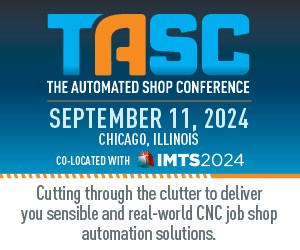DMG Expands Profile In U.S.
The names Deckel and Maho have long ranked among Europe's principal players in milling machines and machining centers. Those names have been put together to form a single company, which in America is known as DMG America.
The names Deckel and Maho have long ranked among Europe's principal players in milling machines and machining centers, particularly those of a universal design. Likewise for Gildemeister who has historically reigned as Europe's largest manufacturer of turning machines, making everything from multiple spindle automatics to multi-axis CNC turn/mill centers. In more recent times, those names have been put together to form a single company, which in America is known as DMG America.
The company has also sought to strengthen its position here with the recent opening of a new headquarters in Schaumburg, Illinois, and the appointment of Allen Turk as President and CEO. According to Mr. Turk, DMG has already achieved a remarkable level of success this year. For instance, in February the company announced that it had received a $35 million order from Fairchild Fasteners for 200 Gildemeister CNC single-spindle and multispindle turning machines. Then DMG received another large order from an Ohio-based valve manufacturer for ten of the new GM 67 CNC turning machines valued at over $9 million.
The GM 67 has an innovative design, combining some of the high-production capabilities of multispindle automatics with the higher precision and quick setup capabilities of a CNC turning center. The machine has three main spindles plus a fully powered subspindle, each with an independent AC drive. The multiple turrets all have live tools, and a Y-axis option is available for contour milling. The machine can handle bar stock up to 2 3/4 inches in diameter.
DMG has also been busy in product development on the milling side of the business. For instance, the new DMU 50 V universal milling machine is designed to more closely and cost-effectively meet real manufacturing requirements. According to the company, the design concept is based on the premise that 85 percent of the actual use of universal milling and boring machines happens with the vertical spindle. Thus the classic concept of a console or bed type universal machine was redesigned to combine the advantages of such machines with those of vertical machining centers. The result is a machine with a vertical spindle where all three linear axes are achieved through the movement of the traveling column and a stationary table. The table comes in three versions— rigid, indexing for four-sided machining, or swivel indexing for full five-sided machining. A full five-axis contouring version is in the works.
Also new is higher speed capabilities in the DMC V line of vertical machining centers, a model designed to suit the needs of die and mold makers. With spindle speeds up to 15,000 rpm and a portal design, the machine is said to provide the stability, stiffness and dynamic performance for accurate cutting of hardened tool steels. Three sizes of the design are available with working cubes of 20 × 16.5 × 20 inches, 28 × 22 × 20 inches, and 39.6 × 32 × 20 inches.
The machines have rapid traverse rates of 1200 ipm in the X and Y axes and tool-change times of 6.5 seconds, chip-to-chip. Also, an optional pallet changer will help increase spindle utilization rates and provide better access for setup.
Read Next
The Automation Event for CNC Machine Shops
Get sensible, real-world automation solutions during this half-day workshop co-located with IMTS 2024.
Read MoreIMTS Elevate Workshop: Make Your Shop a Top Shop
This ½-day program offers attendees insight into the results from this year's Modern Machine Shop Top Shops annual benchmarking survey.
Read MoreA History of Precision: The Invention and Evolution of Swiss-Style Machining
In the late 1800s, a new technology — Swiss-type machines — emerged to serve Switzerland’s growing watchmaking industry. Today, Swiss-machined parts are ubiquitous, and there’s a good reason for that: No other machining technology can produce tiny, complex components more efficiently or at higher quality.
Read More
















.jpg;maxWidth=300;quality=90)




